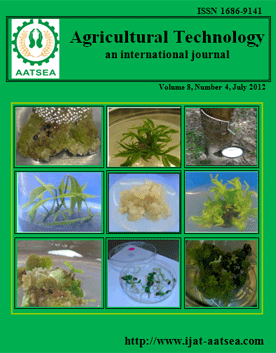ThaiScience
ThaiScience
INTERNATIONAL JOURNAL OF AGRICULTURAL TECHNOLOGY
Volume 18, No. 01, Month JANUARY, Year 2022, Pages 205 - 214
A molecular survey of theileria spp. in ruminants in the thailand-cambodia border region
Kaewhom, P. and Srikijkasemwat, K.
Abstract Download PDF
Theileriosis is caused by Theileria spp. Parasites which transmitted by various species of ticks including Amblyomma, Haemaphysalis, Hyalomma and Rhipicephalus. This pathogen can be found in red blood cells and white blood cells of farmed animals, including cattle, buffaloes, goats and sheep. Theileria spp. leads to a high morbidity in small ruminants, economic loss in agricultural production and time spent on infection prevention. It is necessary to detect the infection in a farm, as there are generally no clearly recognisable clinical signs. Our results revealed that infected animals displayed 230 bp DNA fragments, which is the length of the V4 region of the 18S rRNA gene of Theileria spp. The overall prevalence of Theileria spp. in ruminants farmed in Sa Kaeo Province, the border between Thailand and Cambodia, was 9% (29/314). The prevalence of Theileria spp. in meat cattle (6%), buffaloes(6%), meat goats (6%) and crossbred meat sheep (6%). It was also found that the prevalence of Theileria spp. was linked to neither species nor gender (p>0.05). Polymerase Chain Reaction was used to analyse Theileria spp. since it is very sensitive, specific and fast. Our analysis can be used to prevent and control the spread of Theileria infection in ruminants. Furthermore, this information may guide implemention of a policy on animal movement within the border regions.
Keywords
Infection prevalence, Ruminant, Theileriosis, Theileria parasites, PCR techniqueINTERNATIONAL JOURNAL OF AGRICULTURAL TECHNOLOGY
Published by : Association of Agricultural Technology in Southeast Asia (AATSEA)
Contributions welcome at : http://www.ijat-aatsea.com
